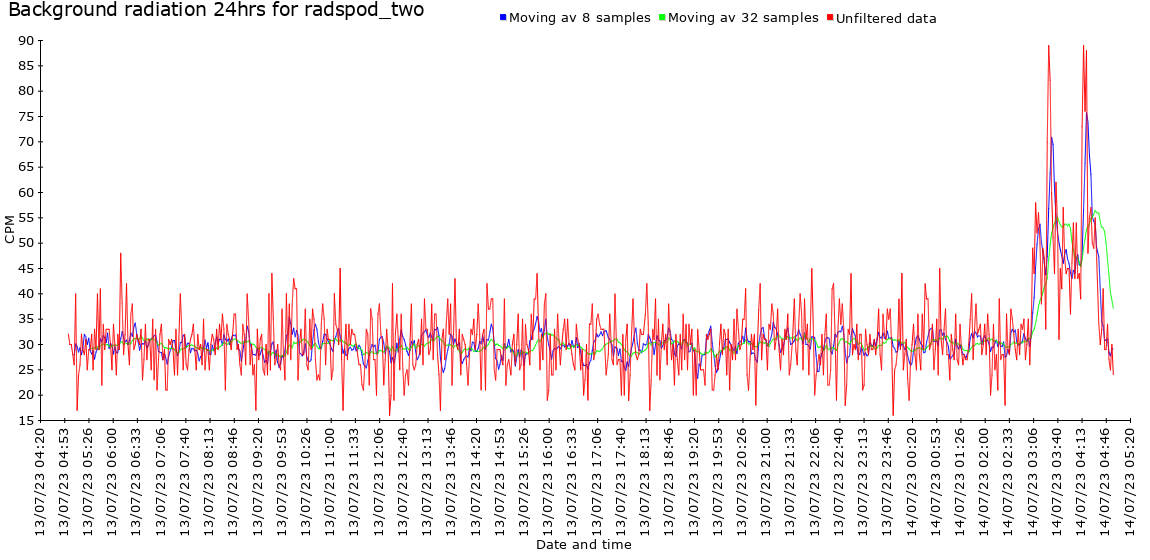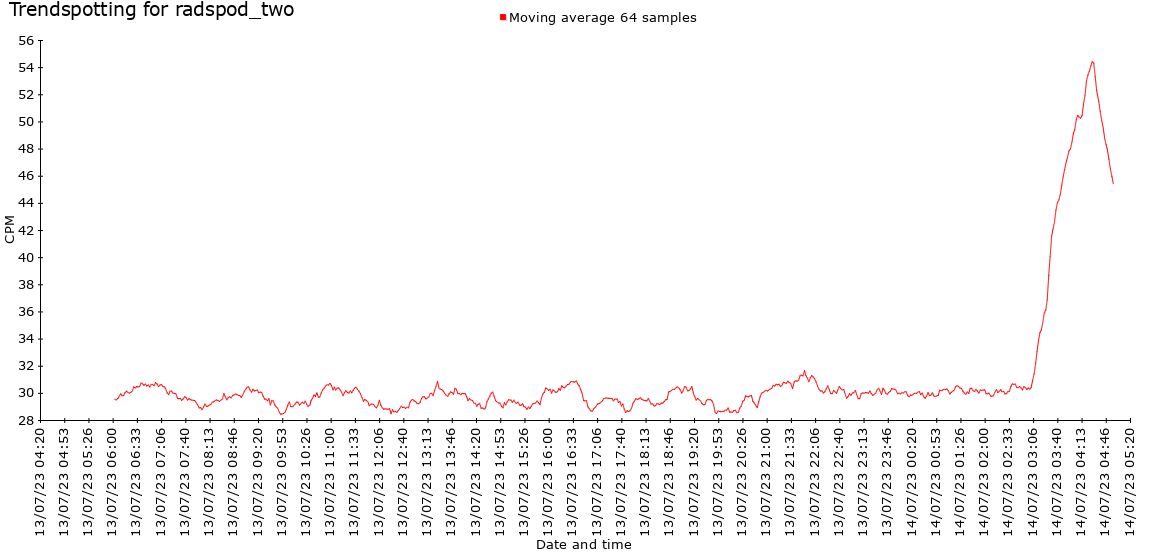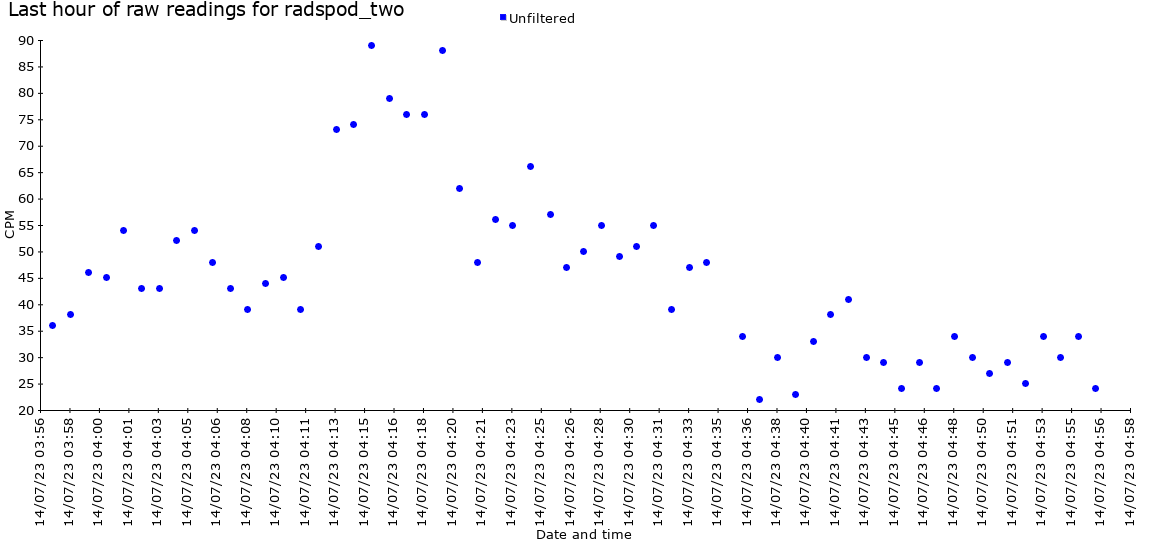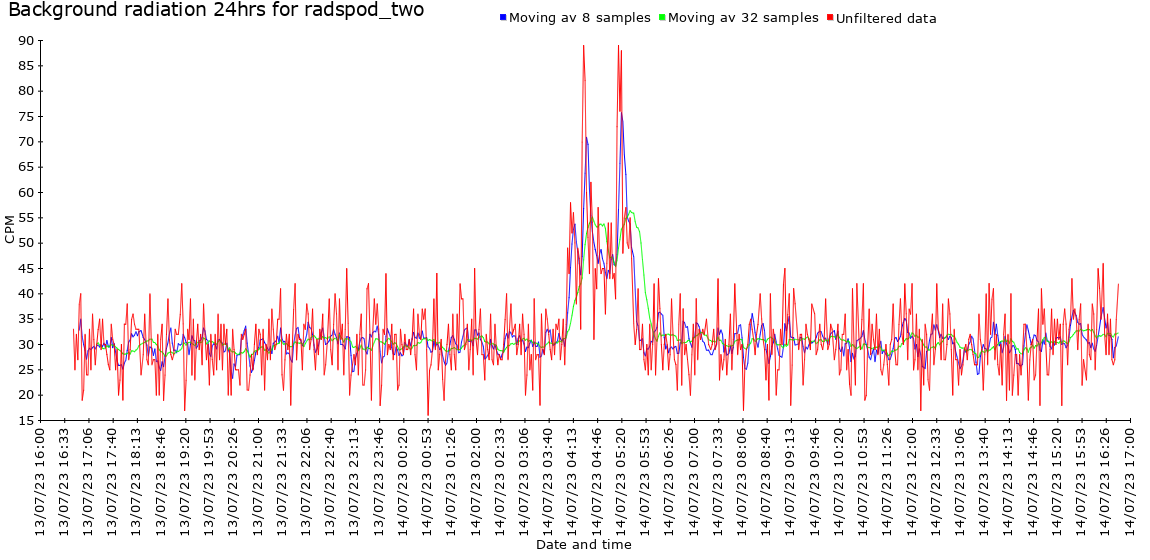- Forum
- Alerts, Detections and Station Updates
- Station detections
- Anomaly? Solar Flare? Something Else?
Anomaly? Solar Flare? Something Else?
2 years 7 months ago #6532
by Simomax
Anomaly? Solar Flare? Something Else? was created by Simomax
Strange goings on this morning.
I was up quite early today and noticed some things weren't working properly. My main counter (radspod_one) hadn't checked in for a while, Blynk wasn't connecting and a couple of network utils weren't working. I looked into it and my little server that runs all of these was offline. This server sits in my workshop at the end of my garden, the same building radspod_one resides at. I tried the usual stuff, but couldn't contact the server so killed the power to the workshop and everything came back up fine. Then whilst checking that my counters were all online here I noticed quite the anomaly with radspod_two. My eyes were drawn to the 'warning' indicator next to the station next to radspod_two. Strange.
For context, radspod_one is run on the radlog software on my server in the workshop. Radspod_two is currently sitting on a shelf next to my window in my office and uses ESP8266 to directly upload to radmon.org. Radspod_two also connects to my Blynk server running on the server in my workshop to record locally. My test station 'Simomax' is sat on my desk in my office, some 2-3 meters away from radspod_two.
After a bit of investigation I noticed that the CPM started to rise for radspod_two right around the same time as radspod_one went offline, around 04:02 UTC (05:02 BST). As Blynk had gone offline with everything else on the computer I have no local historic records for this time. But radspod_two had still been reporting to radmon.org, as well as my test station 'Simomax'. I checked in the DB and sure enough counts had started to rise around the same time the server went offline. Literally. After checking numbers/times etc, radspod_one's (run from radlog on my server) last submission was 04:02 UTC and the CPM on radspod_two started to climb around 04:01. Test station Simomax was pretty much reporting normally. Sadly, as Blynk wasn't running at the time I have no local history from radspod_one, radspod_two or test station Simomax. Radmon does though, just not as fine resolution as my local history.
I think the graphs speak for themselves. So what caused this? If it were a real increase in radiation I'm pretty sure that my test station would have detected that also, but it is a couple of meters away from the wall in my office, and windows etc, whereas radspod_two is right next to the window on a shelf. That uses an SBM-20 tube, so is not light related. Could this have been a solar flare, or other electromagnetic anomaly that caused my server to crash at the same time the counter started reading higher CPM? I guess we will never know, but certainly something to note.
For context, radspod_one is run on the radlog software on my server in the workshop. Radspod_two is currently sitting on a shelf next to my window in my office and uses ESP8266 to directly upload to radmon.org. Radspod_two also connects to my Blynk server running on the server in my workshop to record locally. My test station 'Simomax' is sat on my desk in my office, some 2-3 meters away from radspod_two.
After a bit of investigation I noticed that the CPM started to rise for radspod_two right around the same time as radspod_one went offline, around 04:02 UTC (05:02 BST). As Blynk had gone offline with everything else on the computer I have no local historic records for this time. But radspod_two had still been reporting to radmon.org, as well as my test station 'Simomax'. I checked in the DB and sure enough counts had started to rise around the same time the server went offline. Literally. After checking numbers/times etc, radspod_one's (run from radlog on my server) last submission was 04:02 UTC and the CPM on radspod_two started to climb around 04:01. Test station Simomax was pretty much reporting normally. Sadly, as Blynk wasn't running at the time I have no local history from radspod_one, radspod_two or test station Simomax. Radmon does though, just not as fine resolution as my local history.
I think the graphs speak for themselves. So what caused this? If it were a real increase in radiation I'm pretty sure that my test station would have detected that also, but it is a couple of meters away from the wall in my office, and windows etc, whereas radspod_two is right next to the window on a shelf. That uses an SBM-20 tube, so is not light related. Could this have been a solar flare, or other electromagnetic anomaly that caused my server to crash at the same time the counter started reading higher CPM? I guess we will never know, but certainly something to note.
Attachments:
Please Log in or Create an account to join the conversation.
2 years 7 months ago #6533
by Vinkx
Replied by Vinkx on topic Anomaly? Solar Flare? Something Else?
Just brainstorming here, is it possible that the missing counts from radspot1 somehow got added to the radspot2 data ?
Or else it was a local event, nothing solar, because other detectors would have picked it up ?
Or else it was a local event, nothing solar, because other detectors would have picked it up ?
Please Log in or Create an account to join the conversation.
2 years 7 months ago - 2 years 7 months ago #6534
by Simomax
Replied by Simomax on topic Anomaly? Solar Flare? Something Else?
Hi Vinkx,
Thanks for your reply. No, there is no way the readings from one station can get added to another, its just not in the code. Radmon.org is incapable of doing that even if I wanted it to. I would have to write some extra code for that to happen. The reason radspod_one went offline is the server it is connected to crashed. It disappeared from the network. No ping, nothing. That counter was unable to upload to radmon.org. Due to the server crashing I didn't get any data via Blynk (similar to Thingspeak) as that runs on that server.
That left stations radspod_two (the one with the spike in readings) and station 'Simomax', my test station. Radspod_two is sitting on a shelf pretty close to a window. Station 'Simomax' is sitting on my desk a couple of meters away from the window and is pretty much shielded by a computer monitor in it's way. Both counters were recording. Radspod_two saw a spike, 'Simomax' did not.
There are few things that make a Geiger counter count. Radiation, interference, extreme solar activity/flares, lightning, light photons with certain GM tubes, a fault with the electronics and finally firmware. They are pretty much all of the things I know can make a counter click. So with all of them in mind I run a process of elimination. Keep in mind my server crashed at around the exact same time as the counts started to climb.
(Working backwards)
It also hasn't happened since. Here is today's graph:
Thanks for your reply. No, there is no way the readings from one station can get added to another, its just not in the code. Radmon.org is incapable of doing that even if I wanted it to. I would have to write some extra code for that to happen. The reason radspod_one went offline is the server it is connected to crashed. It disappeared from the network. No ping, nothing. That counter was unable to upload to radmon.org. Due to the server crashing I didn't get any data via Blynk (similar to Thingspeak) as that runs on that server.
That left stations radspod_two (the one with the spike in readings) and station 'Simomax', my test station. Radspod_two is sitting on a shelf pretty close to a window. Station 'Simomax' is sitting on my desk a couple of meters away from the window and is pretty much shielded by a computer monitor in it's way. Both counters were recording. Radspod_two saw a spike, 'Simomax' did not.
There are few things that make a Geiger counter count. Radiation, interference, extreme solar activity/flares, lightning, light photons with certain GM tubes, a fault with the electronics and finally firmware. They are pretty much all of the things I know can make a counter click. So with all of them in mind I run a process of elimination. Keep in mind my server crashed at around the exact same time as the counts started to climb.
(Working backwards)
- Software? I 99.9% doubt the firmware is at fault. It is the same code as I have used on a few counters and also experimented with much. I have had 0 issues with the firmware. Iterations of the same firmware are on this forum and I have never had any reports of it not working. So I think I can rule that out.
- Electronics? Again, I 99.9% doubt the electronics are at fault. The way the counts climbed and fell and peaked again, then went away doesn't suggest electronics. The pattern doesn't fit. It has never done this before, and hasn't since this event. Electronic faults tend to start and stay, or they will be intermittent. They don't usually go into fault, then fix themselves. Electronics faults will often cause erratic readings, or shoot high, or just give a load of 0's. This is also A GK Radmon unit from BroHogan. The electronics have been developed over time and he has sold many units. It is a very reliable counter IMHO. I very much doubt the electronics were at fault.
- Light sensitivity? 100% no. The tube is a SBM-20. It has a metal wall. It isn't affected by light.
- Lightning? Again, no. The weather was fine at 04:00 UTC.
- Extreme solar activity/flares? Maybe, I thought at first, but after looking at the space weather, it appears to have been calm at 04:00 UTC - see here: https://www.spaceweatherlive.com/en/solar-activity/solar-flares.html Solar activity sort of fitted because that counter is close to the window and has very little shielding from the sun. The station 'Simomax' is shielded from the sun by a wall and computer monitor. The monitor's insides are completely shielded by metal, connected to ground, so that would have been a pretty good shield. So, radspod_two = no shielding, 'Simomax' = some shielding. All that said though, The window in my office is west facing and the sun rises in the east. At 04:00 UTC it wouldn't even be visible above the landscape (that I see) looking east. I don't know this would stop a solar flare, but if it didn't and it was a solar flare coming from the east, it would have affected 'Simomax' also. Another reason I thought solar activity was the fact my server crashed around the same time. That server is in a wooden building with felt roof. Not much shielding at all from electromagnetic anything. But with the sun being in the east, space weather showing it was all calm, I think we can rule that out too.
- Interference? Again, maybe, but doubtful. Any kind of RF interference would most likely affect 'Simomax' too. Radspod_two and 'Simomax' are a couple of meters from each other. If some external interference was strong enough to affect radspod_two, it would most likely affect 'Simomax' to some degree. maybe more, maybe less. Station 'Simomax' showed no signs of any rise in CPM during the event.
- That finally leaves radiation. I have since thought of radioactive rain. I have seen this before in the past. It can't be that as it wasn't raining. I do have some sources a couple of meters away from radspod_two, but they are in a fixed position and doesn't affect the readings of that counter. I don't see how anything radioactive could affect it.
It also hasn't happened since. Here is today's graph:
Attachments:
Last edit: 2 years 7 months ago by Simomax.
Please Log in or Create an account to join the conversation.
Moderators: Gamma-Man
- Forum
- Alerts, Detections and Station Updates
- Station detections
- Anomaly? Solar Flare? Something Else?
Time to create page: 0.163 seconds




